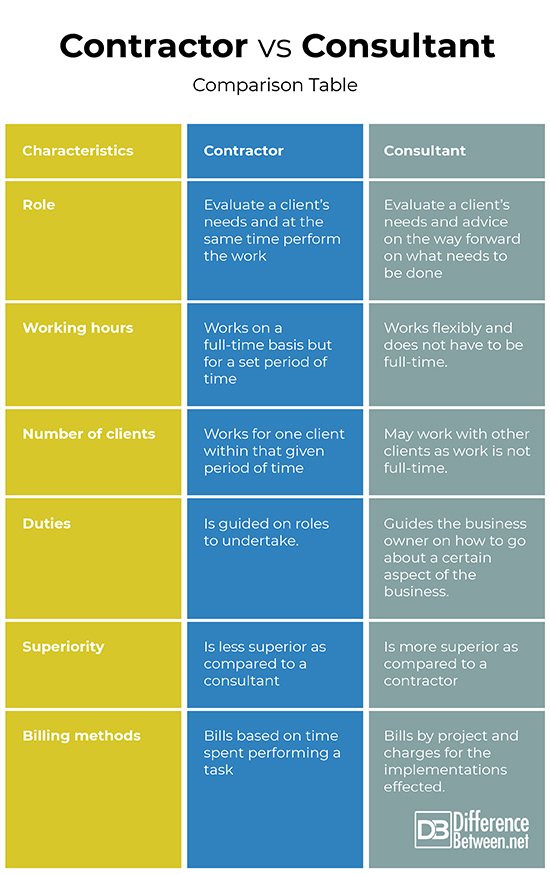Difference Between Contractors and Consultants
The number of self-employed people has risen over time, touching all segments of the economy, from website designers, freelance writers, accountants, business consultants, and even doctors, just to name a few. Terms such as freelancer, small business owners, entrepreneur, contractor, self- employed and consultant have been used to describe independent workers. All these terms basically refer to independent workers who are not full-time employees.
Who is a Contractor?
A contractor works under the employer’s supervision and helps in the completion of a larger project. The employer’s guidelines are followed when it comes to working as a contractor. Most organizations use contractors when they want a certain task done within a limited period of time, but do not wish to hire someone on full-term basis.
Who is a Consultant?
A consultant is an experienced professional who provides expert knowledge I return to a fee. They work as an advisor and hence are not accountable for the outcome of the business. In most cases, consultants have many years of experience in their field and are seen as the most knowledgeable when it comes to consulting.
Most companies bring in consultants when;
- They have an urgent need that needs to be taken care of
- They do not have the know-how on how to go about a certain task
- They have limited time regarding a certain task
The consultant hence comes to analyze the problem and makes a decision on how to solve it, most times using own individual methods and tools of the trade.
Similarities between contractors and consultants
- Both offer outside perspective especially for business owners who would like to improve an area in their business.
- Both offer specialized knowledge and deep insights into the business
- Both may help in cutting costs and time it would take to complete one task
- In both, there are no long-term obligations as work is specified for a fixed period of time.
- Both add to efficacy and efficiency in organizations
Differences between contractors and consultants
-
Role of contractors and consultants
The role of a contractor is to evaluate a client’s needs and perform the work. Consultant’s role, however, is to evaluate a client’s needs and advice forward on what needs to be done.
-
Working hours for contractors and consultants
A contractor works on a full-time basis, but for a set period of time. A consultant’s work is flexible and may choose to work on an hourly basis, but it does not have to be full-time.
-
Number of clients
A contractor works for one client within a set period of time, but a consultant can work with different clients at the same time as the job does not have to be on a full-time basis.
-
Duties involved in being a contractors Vs. consultants
A contractor is guided on the roles to undertake and how to do them while a consultant guides the business owner on measures to undertake in a certain aspect in business.
-
Superiority
When it comes to superiority, a contractor is less superior to a consultant, which is based on the roles both are involved with.
-
Billing methods
A contractor bill the work based on time spent performing a task while consultants bills by project, and charges for implementing the solutions.
Contractor vs. consultant: Comparison Table
Summary of contractors vs. consultants
It has become a trend for many businesses to hire consultants and contractors for different business roles. This is because they provide specialized skilled, save costs and are also flexible. The decision by a business owner pertaining whether to hire a contractor or a consultant goes a long way in ensuring that businesses run smoothly.
- Difference Between Profit Center and Investment Center - July 2, 2022
- Difference Between Anti-Trust and Anti-Competition - June 6, 2022
- Difference Between Stocktaking and Stock Control - June 6, 2022
Search DifferenceBetween.net :
Leave a Response
References :
[0]Fishman Stephen. Consultant & Independent Contractor Agreements. Nolo Publishers, 2017. https://books.google.co.ke/books?id=jkc1DwAAQBAJ&printsec=frontcover&dq=difference+between+a+contractor+and+a+consultant&hl=en&sa=X&ved=0ahUKEwiztJKFqdLeAhVJJcAKHU-LBtAQ6AEIKDAA#v=onepage&q=difference%20between%20a%20contractor%20and%20a%20consultant&f=false
[1]Elvy B.H. How to Become a Consultant. Springer Publishers, 2016. https://books.google.co.ke/books?id=gtG-DAAAQBAJ&printsec=frontcover&dq=difference+between+a+contractor+and+a+consultant&hl=en&sa=X&ved=0ahUKEwiztJKFqdLeAhVJJcAKHU-LBtAQ6AEILjAB#v=onepage&q=difference%20between%20a%20contractor%20and%20a%20consultant&f=false
[2]McLellan Julie. All Above Board: Great Governance for the Government Sector. AICD Publishers, 2005. https://books.google.co.ke/books?id=xS4JQmpb7coC&pg=PA69&dq=difference+between+a+contractor+and+a+consultant&hl=en&sa=X&ved=0ahUKEwiztJKFqdLeAhVJJcAKHU-LBtAQ6AEITjAH#v=onepage&q=difference%20between%20a%20contractor%20and%20a%20consultant&f=false
[3]Image credit: https://www.pexels.com/photo/business-people-commercial-office-the-company-162537/
[4]Image credit: https://pixabay.com/en/consultants-consulting-client-3180641/



